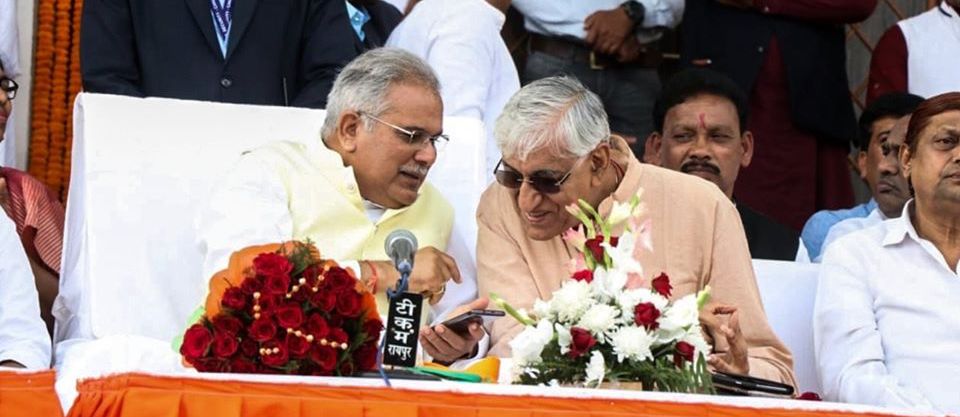New Delhi: This year has marked a series of internal troubles in state units of the Congress where the party is in power, beginning with Rajasthan and then Punjab. The latest entry to this list is Chhattisgarh, which led to the party’s top leadership stepping in on Tuesday to find a resolution for the brewing troubles. The worries for the top leadership have increased given that these are the only three states where there is a Congress chief minister currently.
On Tuesday, Rahul Gandhi, the party’s former president and senior Lok Sabha member, met Chhattisgarh chief minister Bhupesh Baghel and state’s health minister T.S. Singh Deo, who have been at loggerheads over the past few months. The meeting was also attended by K.C. Venugopal, the party’s general secretary in charge of organisation and P.L. Punia, its Chhattisgarh in-charge.
After the meeting on Tuesday, all the three leaders involved directly with Chhattisgarh – Baghel, Deo and Punia – officially maintained that the meeting was limited to discussing the state government’s welfare schemes and planning for the next election. While the next state election is scheduled to take place only at the end of 2023, there are more immediate concerns that the party is focusing on.
“We had a detailed discussion on Chhattisgarh and its different regions. We also discussed the next assembly election and the party’s preparations for it,” Punia told reporters after the meeting in the national capital. When asked about a change of guard or internal troubles in the party’s state unit, Punia said there was “no discussion” on these topics.
Senior party leaders say that at the heart of the trouble in Chhattisgarh is the purported “mid-term formula”. They add that the party has been abuzz with speculation that the senior leadership, at the time of government formation in December 2018, promised that Deo would succeed Baghel for the top post after 2.5 years.
“A section of the party believes that such a promise was indeed made. But a lot has changed in the past two-and-a-half-years and Baghel has strengthened his position not just as a chief minister but also as a party man. If Deo was indeed promised a mid-term elevation, then that works in his favour but it may be too early to say what is on the mind of the high command,” a senior party leader said, requesting anonymity.
Baghel took charge in December 2018 and recently completed 2.5 years in office, which led to a chorus among Deo’s supporters demanding that he should be made the new chief minister. In December last year, Baghel had said that the decision rests with the high command and he would resign whenever he is directed to do so. Deo said earlier this month that chief ministers can change mid-term, but he too added that the decision should be made by the top leadership.
After the meeting on Tuesday, Deo denied that he had put any ‘ultimatum’ but reiterated that Rahul Gandhi and party chief Sonia Gandhi’s directions would be followed in Chhattisgarh.
“The meeting was all about working for Chhattisgarh. We are all together in this with Sonia Gandhi and Rahul Gandhi. We are part of the family which is headed by both of them and there are no differences in that family. Whatever they advise will be done,” Deo told reporters after the meeting.
Senior party leaders feel that Deo was ‘not pushing hard’ until the time that a sitting MLA, Brihaspat Singh, accused him of an attack. The issue blew over as Deo and his supporters demanded that the statement should be taken back and disciplinary action be initiated against Singh, eventually leading to the senior leadership seeking clarification.
“There is a view among supporters of Deo that if they do not make their presence felt right now, they may get pushed more to the corner. They made it clear to the senior leadership that this would not work,” another party leader said, also requesting anonymity.
The Congress had swept to power in Chhatisgarh with a two-thirds majority in December 2018, ending the more than 15 years of Bharatiya Janata Party rule under Raman Singh. Experts feel that a change of guard in Chhattisgarh is ‘very unlikely’ as doing so would give an opportunity to the BJP to politically take on the Congress ahead of the next elections.
“In my opinion, a leadership change is an absolute no. If that happens, it will be a big election issue that the BJP can gain from and I am sure the Congress’ top leadership is keeping this fallout in mind. I think what may happen is the top leadership may offer Deo and his key supporters some added responsibilities in either the state government or party unit,” said Lakhan Chaudhary, a Raipur-based political analyst associated with the Lokniti Network of the Centre for the Study of Developing Societies (CSDS), Delhi.
Anuja is an independent journalist based in New Delhi who reports on the intersection of policy and politics. She can be reached at @just_anuja.
